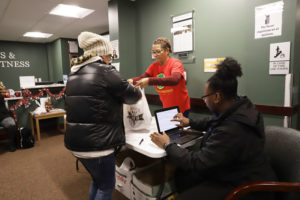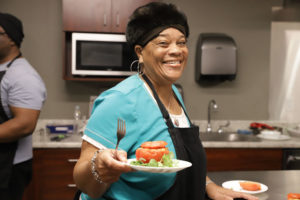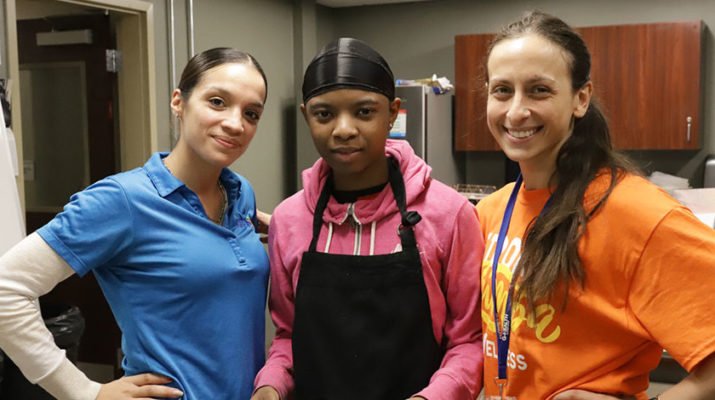By Jana Eisenberg

Over 40% of Buffalo residents are on Medicaid, the federally funded healthcare program that covers people because of their low-income status or other factors, according to recent data from Deloitte/DataUSA.
Frequently, people with low income — those living in poverty — experience one or more multiple chronic diseases (such as hypertension, diabetes, and obesity).
And, says physician Raul Vazquez, there are things that can be done to both improve their health.
Vazquez is the founder and chief executive officer of the Greater Buffalo United Area Health Network (GBUAHN, pronounced “gee-bawn”), which is a “health home,” created under the Affordable Care Act, Section 2703. Health homes are organizations which provide care coordination and a variety of other services for exactly this population: people on Medicaid who have multiple or severe chronic conditions.
GBUAHN’s mission is to transform health care by removing barriers for people in underserved communities and populations. So, in addition to standard medical care, GBUAHN provides or refers patients for everything from transportation, housing and job training to access to and education about fresh food, how diet affects health, and other opportunities around everything related to those topics, such as eating, cooking, and exercise.
Many health homes provide wellness programs, and Vazquez feels that it’s an important part of having a positive effect on people’s lives.
One of GBUAHN’s facilities, at 564 Niagara St. in Buffalo, houses Vazquez’s medical offices, as well as an imaging center, a fitness center, a teaching kitchen and specialists’ offices.
Vazquez believes that doctors want to help their patients in these deeper ways, but that the system is not set up to make it easy.
“Doctors should not be in silos; it’s difficult to help people when you are always sending them elsewhere for specialist visits to or weight management,” he said. “I call GBUAHN a ‘medical neighborhood’: we can integrate those things into our medical practice. We took nutritionists, chefs, and personal trainers and created a wellness model. We want to remove barriers to accessing health and wellness care—what are called ‘social determinants of health,’ or the things that have an effect on people’s health, like their income, where they live, their education, their job, etc.”

With everything integrated, adds Vazquez, his team can measure to gauge if the approach is working. “We’ve seen major positive impacts, for example, on how people with diabetes feel after taking part in the wellness programs. Even better, they feel a sense of community; they enjoy going to our cooking classes or working out in our gym,” he said. “And, while they’re here, we can assess them, monitor their blood pressure and weight; we’re able get information about whether the foods, exercise and instructions we’re providing are actually changing people’s lives.”
GBUAHN even has a collaboration with the African Heritage Food Co-op, through which patients can get vouchers for fresh food. The Co-op now has two locations, as well as offering mobile food markets.
GBUAHN nutritionists and chefs work with patients, counseling them on food choices. For example, while fresh whole fruit is always better than any other desserts, people with diabetes should still limit their intake of very high-sugar fruits, like pineapple or strawberries, said Vazquez. If someone with hypertension reports that they never add salt, but then says that they use a lot of ketchup, they need help understanding how much salt is in that and other products. Nutritionists help them to identify palatable substitutes, and the African Heritage Food Co-op actually provides access to some of the food.
Jennifer Lepper works at the co-op; she’s also a former chef, and frequently comes into contact with GBUAHN patients. She noted that many neighborhoods with low-income populations are “food deserts,” with limited access to fresh food. She iterates the barriers that people face who want to eat better. “If you can’t get to a place to get good quality fresh, whole foods, maybe because of the lack of stores, or you don’t have a car, you can end up purchasing higher-calorie and more processed foods,” she said. “A lot of people do all their shopping at Walmart; if they have to take one or two busses to get there, how much can they carry? Having something in the neighborhood makes it more accessible.”
“Eating better—consuming less fat and salt, and fewer processed foods — can greatly improve people’s health,” continued Lepper. “GBAUHN is helping people learn how to make food that they wouldn’t have access to or know about. People might ask me what something is, like acorn squash. I’m a chef, I tell people how I make it, or give them some suggestions. They appreciate it, and when they come back, I ask them how it came out.”
“After accessing our programs and wellness model, I’ve seen some patients lose 60 or 80 pounds. It’s incredible!” said Vazquez. “I will see them when I’m working out in our gym, and they’re unrecognizable! I talk with them, and they say they’re feeling better, and their mental health is better. In those moments, I know we’re accomplishing our mission: we’ve changed that person’s life.”
Photo: GBUAHN patient health navigator Janice Neal (from left) member Desire Love, and registered dietitian Deanna Gallicchio.

